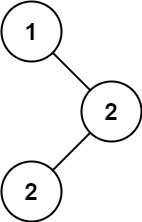Find Mode in Binary Search Tree - Two solutions: O(h) space and O(1) space
Problem Statement:
Given the root of a binary search tree (BST) with duplicates, return all the mode(s) (i.e., the most frequently occurred element) in it.
If the tree has more than one mode, return them in any order.
Assume a BST is defined as follows:
- The left subtree of a node contains only nodes with keys less than or equal to the node's key.
- The right subtree of a node contains only nodes with keys greater than or equal to the node's key.
- Both the left and right subtrees must also be binary search trees.
Example 1:

Input: root = [1,null,2,2] Output: [2]
Example 2:
Input: root = [0] Output: [0]
Constraints:
- The number of nodes in the tree is in the range
[1, 104]. -105 <= Node.val <= 105
Follow up: Could you do that without using any extra space? (Assume that the implicit stack space incurred due to recursion does not count).
Solution:
I will present two solutions. First one is based on Tree Iterator which is O(h) in space where h is the height of tree and second is O(1) in space based on inorder traversal.
In both the solutions, we need the following idea:
Consider this problem: Given a stream of integers in sorted order, find the mode(s) at any point. How do you do this without mantaining a frequency map?
Following is a code snippet that gives this idea:
int cur_elem = arr[0], cur_count = 1;
int max_elem = arr[0], max_count = 1;
vector<int> modes; modes.push_back(arr[0]);
for (int i = 1; i < arr.size(); i++) {
if (arr[i] == cur_elem) cur_count++;
else {cur_elem = arr[i]; cur_count = 1;}
if (cur_count > max_count) {
max_elem = cur_elem; max_count = cur_count;
modes.clear(); modes.push_back(max_elem);
}
if (cur_count == max_count && cur_elem != max_elem)
modes.push_back(cur_elem);
}
Now that we know how to do this for a sorted array, we can do this exact same thing for a BST using an iterator which gives us this solution.
class TreeIterator
{
public:
stack<TreeNode*> nodes;
TreeIterator(TreeNode *root){goLeft(root);}
bool hasNext(){return !nodes.empty();}
TreeNode *getNext()
{
TreeNode *cur = nodes.top();
nodes.pop();
if (cur->right) goLeft(cur->right);
return cur;
}
void goLeft(TreeNode *root)
{
while(root){nodes.push(root); root=root->left;}
}
};
class Solution {
public:
vector<int> findMode(TreeNode* root)
{
TreeIterator itr = TreeIterator(root);
vector<int> res;
int cur_elem=itr.getNext()->val, cur_count=1;
int max_elem=cur_elem, max_count=1;
res.push_back(cur_elem);
while (itr.hasNext())
{
int elem = itr.getNext()->val;
if (elem==cur_elem) cur_count ++;
else
{
cur_elem = elem;
cur_count = 1;
}
if (cur_count>max_count)
{
max_elem = cur_elem;
max_count = cur_count;
res.clear();
res.push_back(max_elem);
}
if (cur_count==max_count && cur_elem!=max_elem) res.push_back(cur_elem);
}
return res;
}
};
A tree iterator requires O(h) space for the stack. We can do away with that using an inorder traversal.
class Solution {
vector<int> res;
int cur_elem, cur_count, max_elem, max_count;
bool first_element;
void inorder(TreeNode *root)
{
if(!root) return;
inorder(root->left);
int elem = root->val;
if (first_element)
{
first_element = false;
cur_elem = elem;
max_elem = elem;
cur_count = 1;
max_count = 1;
res.push_back(elem);
inorder(root->right);
return;
}
if (elem==cur_elem) cur_count ++;
else
{
cur_elem = elem;
cur_count = 1;
}
if (cur_count>max_count)
{
max_elem = cur_elem;
max_count = cur_count;
res.clear();
res.push_back(max_elem);
}
if (cur_count==max_count && cur_elem!=max_elem) res.push_back(cur_elem);
inorder(root->right);
}
public:
vector<int> findMode(TreeNode* root)
{
first_element = true;
inorder(root);
return res;
}
};